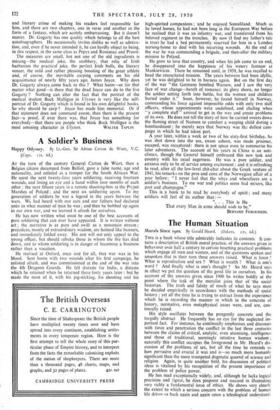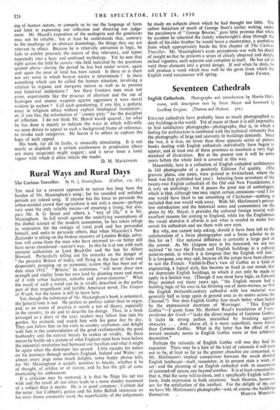The Human Situation
Morals Since 19oo. By Gerald Heard. (Dakers. 12s. 6d.) THIS is a book whose title admirably indicates its contents. If con- tains a description of British moral practice, of the answers given in behaviour over half a century to certain besetting practical problems which engage all men and women, and of the questions spoken and unspoken that in their turn these answers raised. What is force ? What is reproduction and sex ? What is wealth ? What is one's word ? And finally what is one's thought ? So Mr. Heard says in effect we put the question of the good life to ourselves. In his account of the answers given since 1900 he writes boldly at the point where the task of the moralist joins that of 'the social historian. The truth and falsity of much of what he says must be decided empirically in accordance with the methods of social history ; yet all the time he is trying to extract from the experience which he is recording the manner in which in the concrete of history, normative, even metaphysical issues were, and are, con- tinually raised.
His style oscillates between the pungently concrete and the turgidly abstract He frequently has an eye for the neglected im- portant fact. For instance, he continually emphasises and discusses with force and penetration the conflict in the last three centuries between the claims of critical, analytic, even atomising, intelligence and those of traditional, seemingly intuitive human wisdom ; naturally this conflict occupies the foreground in Mr. Heard's dis- cussion of the problems of sex, but all the time he reminds us how pervasive and crucial it was and is—so much more humanly significant than the more trumpeted dogmatic quarrel of science and religion. Again, in quite another field, his discussion of political ideas is vitalised by his recognition of the present importance of the problem of police power.
He has read exceptionally widely, and, although he lacks logical precision and rigour, he does pinpoint and succeed in illustrating very richly a fundamental issue of ethics. He shows very clearly the extent to which a serious concern with the problem of human life drives us back again and again upon a teleological understand- ing of human nature, or compels us to use the language of form and limit in expressing our reflection and directing our judge- ment. Mr. Heard's exposition of the ecologists and the geneticists may not be reliable but at least he understands that, contrary to the teachings of an abstract deontology, the things they say are relevant to ethics. Because he is relatively untrained in logic, he fails to exhibit precisely the nature of that relevancy, and lapses repeatedly into a hazy and confused mythology. Yet he sees that right across the field he covers—the field indicated by the questions quoted above—during the period he has had under review, again and again the issue of limit has been raised. Is there or is there not any sense in which human nature is determinate ? Is there something which can be called the human situation, involving a relation to organic and inorganic nature as well as to persons and historical institutions ? Are there frontiers men must not cross, experiments like the practice of abortion and the use of hydrogen and atomic weapons againstaggressors it were moral wisdom to eschew ? Call such questioning, if you like, a pathetic essay in religious ethics without explicit theological foundation ; or, if you like, the substitution of " cosmic piety " for the discipline of reflection. I do not think Mr. Heard would quarrel ; for what he has done is mainly to indicate the ways in which willy-nilly we seem driven to appeal to such a background frame of reference, to invoke such categories. He leaves it to others to capture the logic of such appeal. • His book, for all its faults, is unusually stimulating. It is not nearly as slapdash as a certain carelessness in production (there are many misprints) might suggest ; and it never loses a tonic vigour with which it often infects the reader. D. M. MACKINNON.



































 Previous page
Previous page